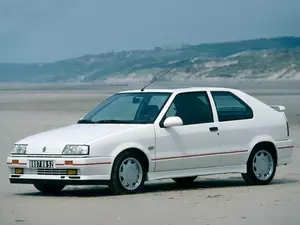
| Vehicle | Precise engine size | Difference from world average | Engine size to consumption ratio | Horsepower from 1 L | Engine size to 100 kg of weight |
|---|---|---|---|---|---|
| 1.4i |
1.39 L (1390 cc) |
40.8% smaller | 41 cc to 1 mpg | 43 hp from 1 L | 139 cc to 100 kg |
| 1.6i |
1.6 L (1598 cc) |
31.9% smaller | 47 cc to 1 mpg | 56 hp from 1 L | 160 cc to 100 kg |
| Vehicle | 1.4i |
|---|---|
| Precise engine size | 1.39 L (1390 cc) |
| Difference from world average | 40.8 smaller |
| Engine size to consumption ratio | 41 cc to 1 mpg |
| Horsepower from 1 L | 43 hp from 1 L |
| Engine size to 100 kg of weight | 139 cc to 100 kg |
| Vehicle | 1.6i |
| Precise engine size | 1.6 L (1598 cc) |
| Difference from world average | 31.9 smaller |
| Engine size to consumption ratio | 47 cc to 1 mpg |
| Horsepower from 1 L | 56 hp from 1 L |
| Engine size to 100 kg of weight | 160 cc to 100 kg |
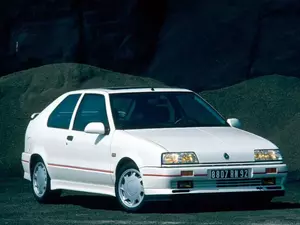
| Vehicle | Precise engine size | Difference from world average | Engine size to consumption ratio | Horsepower from 1 L | Engine size to 100 kg of weight |
|---|---|---|---|---|---|
| 1.4i |
1.39 L (1390 cc) |
40.8% smaller | 39 cc to 1 mpg | 58 hp from 1 L | 139 cc to 100 kg |
| 1.4 i |
1.39 L (1390 cc) |
40.8% smaller | 41 cc to 1 mpg | 43 hp from 1 L | 139 cc to 100 kg |
| 1.8 i |
1.79 L (1794 cc) |
23.5% smaller | 64 cc to 1 mpg | 60 hp from 1 L | 179 cc to 100 kg |
| 1.8 i 16V |
1.76 L (1764 cc) |
24.8% smaller | 57 cc to 1 mpg | 78 hp from 1 L | 147 cc to 100 kg |
| 1.7i |
1.72 L (1721 cc) |
26.6% smaller | 52 cc to 1 mpg | 42 hp from 1 L | 172 cc to 100 kg |
| 1.8i s |
1.79 L (1794 cc) |
23.5% smaller | 62 cc to 1 mpg | 50 hp from 1 L | 179 cc to 100 kg |
| 1.9 D |
1.87 L (1870 cc) |
20.3% smaller | 48 cc to 1 mpg | 34 hp from 1 L | 187 cc to 100 kg |
| 1.9 DT |
1.87 L (1870 cc) |
20.3% smaller | 47 cc to 1 mpg | 48 hp from 1 L | 170 cc to 100 kg |
| Vehicle | 1.4i |
|---|---|
| Precise engine size | 1.39 L (1390 cc) |
| Difference from world average | 40.8 smaller |
| Engine size to consumption ratio | 39 cc to 1 mpg |
| Horsepower from 1 L | 58 hp from 1 L |
| Engine size to 100 kg of weight | 139 cc to 100 kg |
| Vehicle | 1.4 i |
| Precise engine size | 1.39 L (1390 cc) |
| Difference from world average | 40.8 smaller |
| Engine size to consumption ratio | 41 cc to 1 mpg |
| Horsepower from 1 L | 43 hp from 1 L |
| Engine size to 100 kg of weight | 139 cc to 100 kg |
| Vehicle | 1.8 i |
| Precise engine size | 1.79 L (1794 cc) |
| Difference from world average | 23.5 smaller |
| Engine size to consumption ratio | 64 cc to 1 mpg |
| Horsepower from 1 L | 60 hp from 1 L |
| Engine size to 100 kg of weight | 179 cc to 100 kg |
| Vehicle | 1.8 i 16V |
| Precise engine size | 1.76 L (1764 cc) |
| Difference from world average | 24.8 smaller |
| Engine size to consumption ratio | 57 cc to 1 mpg |
| Horsepower from 1 L | 78 hp from 1 L |
| Engine size to 100 kg of weight | 147 cc to 100 kg |
| Vehicle | 1.7i |
| Precise engine size | 1.72 L (1721 cc) |
| Difference from world average | 26.6 smaller |
| Engine size to consumption ratio | 52 cc to 1 mpg |
| Horsepower from 1 L | 42 hp from 1 L |
| Engine size to 100 kg of weight | 172 cc to 100 kg |
| Vehicle | 1.8i s |
| Precise engine size | 1.79 L (1794 cc) |
| Difference from world average | 23.5 smaller |
| Engine size to consumption ratio | 62 cc to 1 mpg |
| Horsepower from 1 L | 50 hp from 1 L |
| Engine size to 100 kg of weight | 179 cc to 100 kg |
| Vehicle | 1.9 D |
| Precise engine size | 1.87 L (1870 cc) |
| Difference from world average | 20.3 smaller |
| Engine size to consumption ratio | 48 cc to 1 mpg |
| Horsepower from 1 L | 34 hp from 1 L |
| Engine size to 100 kg of weight | 187 cc to 100 kg |
| Vehicle | 1.9 DT |
| Precise engine size | 1.87 L (1870 cc) |
| Difference from world average | 20.3 smaller |
| Engine size to consumption ratio | 47 cc to 1 mpg |
| Horsepower from 1 L | 48 hp from 1 L |
| Engine size to 100 kg of weight | 170 cc to 100 kg |
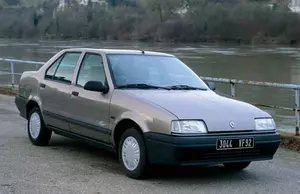
| Vehicle | Precise engine size | Difference from world average | Engine size to consumption ratio | Horsepower from 1 L | Engine size to 100 kg of weight |
|---|---|---|---|---|---|
| 1.4i |
1.39 L (1390 cc) |
40.8% smaller | 39 cc to 1 mpg | 58 hp from 1 L | 139 cc to 100 kg |
| 1.4 i |
1.39 L (1390 cc) |
40.8% smaller | 41 cc to 1 mpg | 43 hp from 1 L | 139 cc to 100 kg |
| 1.7i |
1.72 L (1721 cc) |
26.6% smaller | 52 cc to 1 mpg | 42 hp from 1 L | 172 cc to 100 kg |
| 1.8 i 16V |
1.76 L (1764 cc) |
24.8% smaller | 57 cc to 1 mpg | 77 hp from 1 L | 147 cc to 100 kg |
| 1.8 i |
1.79 L (1794 cc) |
23.5% smaller | 62 cc to 1 mpg | 63 hp from 1 L | 163 cc to 100 kg |
| 1.8i s |
1.79 L (1794 cc) |
23.5% smaller | 62 cc to 1 mpg | 50 hp from 1 L | 179 cc to 100 kg |
| 1.9 DT |
1.87 L (1870 cc) |
20.3% smaller | 47 cc to 1 mpg | 48 hp from 1 L | 170 cc to 100 kg |
| 1.9 D |
1.87 L (1870 cc) |
20.3% smaller | 48 cc to 1 mpg | 34 hp from 1 L | 170 cc to 100 kg |
| Vehicle | 1.4i |
|---|---|
| Precise engine size | 1.39 L (1390 cc) |
| Difference from world average | 40.8 smaller |
| Engine size to consumption ratio | 39 cc to 1 mpg |
| Horsepower from 1 L | 58 hp from 1 L |
| Engine size to 100 kg of weight | 139 cc to 100 kg |
| Vehicle | 1.4 i |
| Precise engine size | 1.39 L (1390 cc) |
| Difference from world average | 40.8 smaller |
| Engine size to consumption ratio | 41 cc to 1 mpg |
| Horsepower from 1 L | 43 hp from 1 L |
| Engine size to 100 kg of weight | 139 cc to 100 kg |
| Vehicle | 1.7i |
| Precise engine size | 1.72 L (1721 cc) |
| Difference from world average | 26.6 smaller |
| Engine size to consumption ratio | 52 cc to 1 mpg |
| Horsepower from 1 L | 42 hp from 1 L |
| Engine size to 100 kg of weight | 172 cc to 100 kg |
| Vehicle | 1.8 i 16V |
| Precise engine size | 1.76 L (1764 cc) |
| Difference from world average | 24.8 smaller |
| Engine size to consumption ratio | 57 cc to 1 mpg |
| Horsepower from 1 L | 77 hp from 1 L |
| Engine size to 100 kg of weight | 147 cc to 100 kg |
| Vehicle | 1.8 i |
| Precise engine size | 1.79 L (1794 cc) |
| Difference from world average | 23.5 smaller |
| Engine size to consumption ratio | 62 cc to 1 mpg |
| Horsepower from 1 L | 63 hp from 1 L |
| Engine size to 100 kg of weight | 163 cc to 100 kg |
| Vehicle | 1.8i s |
| Precise engine size | 1.79 L (1794 cc) |
| Difference from world average | 23.5 smaller |
| Engine size to consumption ratio | 62 cc to 1 mpg |
| Horsepower from 1 L | 50 hp from 1 L |
| Engine size to 100 kg of weight | 179 cc to 100 kg |
| Vehicle | 1.9 DT |
| Precise engine size | 1.87 L (1870 cc) |
| Difference from world average | 20.3 smaller |
| Engine size to consumption ratio | 47 cc to 1 mpg |
| Horsepower from 1 L | 48 hp from 1 L |
| Engine size to 100 kg of weight | 170 cc to 100 kg |
| Vehicle | 1.9 D |
| Precise engine size | 1.87 L (1870 cc) |
| Difference from world average | 20.3 smaller |
| Engine size to consumption ratio | 48 cc to 1 mpg |
| Horsepower from 1 L | 34 hp from 1 L |
| Engine size to 100 kg of weight | 170 cc to 100 kg |
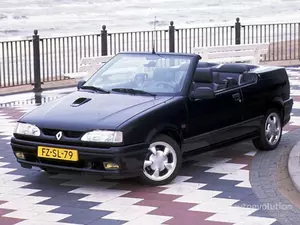
| Vehicle | Precise engine size | Difference from world average | Engine size to consumption ratio | Horsepower from 1 L | Engine size to 100 kg of weight |
|---|---|---|---|---|---|
| 1.8 i 16V |
1.76 L (1764 cc) |
24.8% smaller | 63 cc to 1 mpg | 77 hp from 1 L | 147 cc to 100 kg |
| 1.8i |
1.79 L (1794 cc) |
23.5% smaller | 64 cc to 1 mpg | 50 hp from 1 L | 163 cc to 100 kg |
| 1.8 i RSi |
1.79 L (1794 cc) |
23.5% smaller | 64 cc to 1 mpg | 60 hp from 1 L | 163 cc to 100 kg |
| Vehicle | 1.8 i 16V |
|---|---|
| Precise engine size | 1.76 L (1764 cc) |
| Difference from world average | 24.8 smaller |
| Engine size to consumption ratio | 63 cc to 1 mpg |
| Horsepower from 1 L | 77 hp from 1 L |
| Engine size to 100 kg of weight | 147 cc to 100 kg |
| Vehicle | 1.8i |
| Precise engine size | 1.79 L (1794 cc) |
| Difference from world average | 23.5 smaller |
| Engine size to consumption ratio | 64 cc to 1 mpg |
| Horsepower from 1 L | 50 hp from 1 L |
| Engine size to 100 kg of weight | 163 cc to 100 kg |
| Vehicle | 1.8 i RSi |
| Precise engine size | 1.79 L (1794 cc) |
| Difference from world average | 23.5 smaller |
| Engine size to consumption ratio | 64 cc to 1 mpg |
| Horsepower from 1 L | 60 hp from 1 L |
| Engine size to 100 kg of weight | 163 cc to 100 kg |
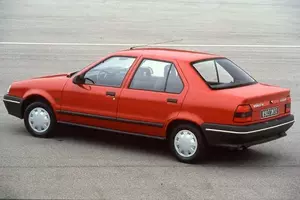
| Vehicle | Precise engine size | Difference from world average | Engine size to consumption ratio | Horsepower from 1 L | Engine size to 100 kg of weight |
|---|---|---|---|---|---|
| 1.7 |
1.72 L (1721 cc) |
26.6% smaller | 57 cc to 1 mpg | 52 hp from 1 L | 172 cc to 100 kg |
| Vehicle | 1.7 |
|---|---|
| Precise engine size | 1.72 L (1721 cc) |
| Difference from world average | 26.6 smaller |
| Engine size to consumption ratio | 57 cc to 1 mpg |
| Horsepower from 1 L | 52 hp from 1 L |
| Engine size to 100 kg of weight | 172 cc to 100 kg |
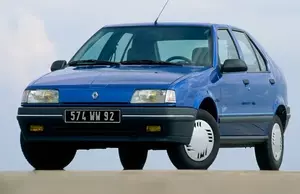
| Vehicle | Precise engine size | Difference from world average | Engine size to consumption ratio | Horsepower from 1 L | Engine size to 100 kg of weight |
|---|---|---|---|---|---|
| 1.4 |
1.4 L (1397 cc) |
40.5% smaller | 41 cc to 1 mpg | 41 hp from 1 L | 140 cc to 100 kg |
| 1.7 |
1.72 L (1721 cc) |
26.6% smaller | 56 cc to 1 mpg | 42 hp from 1 L | - |
| Vehicle | 1.4 |
|---|---|
| Precise engine size | 1.4 L (1397 cc) |
| Difference from world average | 40.5 smaller |
| Engine size to consumption ratio | 41 cc to 1 mpg |
| Horsepower from 1 L | 41 hp from 1 L |
| Engine size to 100 kg of weight | 140 cc to 100 kg |
| Vehicle | 1.7 |
| Precise engine size | 1.72 L (1721 cc) |
| Difference from world average | 26.6 smaller |
| Engine size to consumption ratio | 56 cc to 1 mpg |
| Horsepower from 1 L | 42 hp from 1 L |
| Engine size to 100 kg of weight | - |